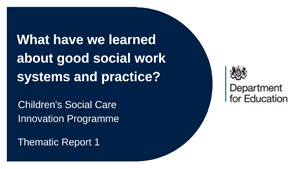
Most people seem to agree what needs to happen to improve children's social work. If you read the recent research, policy and practice literature you'll find several recurring themes such as the importance of leadership, organisational culture, inter-agency working, workforce engagement and stability. All of these are seen as vital conditions to enable good social work to develop and thrive. Yet, despite this apparent consensus, there is surprisingly little evidence about what local authorities do to create these conditions and even less on whether they are successful.
The Department of Education's Innovation Programme for children's social care has included 17 projects funded as part of round one with a specific focus on improving social work systems and practice. These have all been independently evaluated. As the overall evaluation co-ordinator for round one of the programme, the Rees Centre at the University of Oxford got the task of synthesising the lessons from the 17 reports.
Although the 17 projects in this theme varied in their contexts and approaches, they had some common features and goals. Several were underpinned by an explicit model. Core principles reflected in virtually all projects were: maintaining clarity of purpose with a clear focus on the child; taking a strengths based approach; engaging with families as partners in defining and resolving their own difficulties; seeing the role of the worker as an agent of change; enabling practitioners to work directly with families and equipping them with the skills, tools and specialist expertise to do so; recognising the role of the wider organisation in creating the conditions and culture in which good practice can be maintained.
Almost all the projects were successfully implemented, delivering their plans in the timescale. Furthermore, most evaluations reported some positive change in social work practice and improvements in the experience of families. Although the assessment of outcomes was limited in the time available, there were positive indications, including examples of reductions in the numbers of children looked after and in the use of child protection plans. There were also promising signs of cost savings for some projects.
The evaluations provide a rich source of intelligence on what constitutes good social work practice and how this can be developed. The key ingredients include: a shared understanding of good practice - usually supported by a clearly communicated model or set of principles; confidence, skills and tools to assess and work with families; an ability to engage the whole family in ways which combine empathy, authority and clarity of goals; cultural competence.
Common features of projects which appear to be successful in developing these ingredients include:
The conditions which help to establish and sustain these features include: a culture of leadership embedded in the system; strong multi-agency commitment, effective communication and promotion of a shared ethos; alignment of processes such as IT and recording systems and good use of data for planning and performance monitoring.
The report 'What have we learned about good social work systems and practice?' by Di McNeish with Professor Judy Sebba, Dr Nikki Luke and Dr Alun Rees is available here
<< Back to Blogs